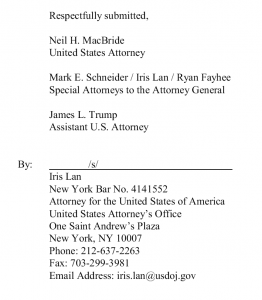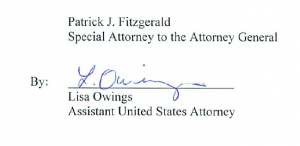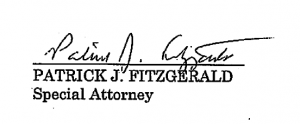DOJ’s News Media Policies Reserved the Authority to Force James Risen to Testify
James Risen’s lawyer, Joel Kurtzberg, argues that the News Media Policies released by DOJ last week mean his client should not have to testify in the Jeffrey Sterling case. (As I understand it, Michael Isikoff made a similar argument while moderating a panel including Eastern District of VA US Attorney Neil MacBride today too, though MacBride reportedly dodged any answer.) In a letter to the Fourth Circuit (which has been sitting on this decision for well over a year), he cites two paragraphs from the Policies — one affirming DOJ’s promise to access “member of the news media” materials only as a last resort, and another one calling for the “appropriate balance” between two competing interests of “protecting the American people” and “free press” — and then claims,
the standard that the DOJ now articulates in the report is the very same standard that the government argues should not be applied to Mr. Risen by the court in this case. The DOJ’s recent change in position is nothing less than an admission that the legal standard it asks this court to apply provides wholly inadequate protection for the interests at stake in this case.
Unfortunately, I think Kurtzberg misreads the way DOJ has specifically left Risen unprotected.
The first paragraph Kurtzberg cites ends,
The Department’s policy is to utilize such tools only as a last resort after all reasonable alternative investigative steps have been taken, and when the information sought is essential to a successful investigation or prosecution.
DOJ’s rules used to be interpreted to say sources would have to testify only if their testimony (or records) was necessary to identify their source or the content of the leak. This is the standard Leonie Brinkema used when she ruled Risen didn’t have to testimony because the government had already identified his source.
But with the language reserving the right to access journalist records or testimony if it is “essential to a successful prosecution,” DOJ has specifically reserved the right to do what they are doing in the Sterling case.
Indeed, their appeal of Brinkema’s decision argues that Risen must testify because it is crucial to the prosecution.
Risen is the only eyewitness to the crime and, as the recipient of the classified information at issue, he is inextricably linked to the criminal conduct. Risen’s testimony is the only direct evidence of Sterling’s guilt; no circumstantial evidence, or combination thereof, is as probative as Risen’s testimony or as certain to foreclose the possibility of reasonable doubt The information Risen can provide is therefore relevant and unavailable from other sources, and the government has demonstrated a compelling need for Risen’s testimony.
That is, even though DOJ has a slew of other evidence they say will prove Jeffrey Sterling was Risen’s source about a botched effort to deal Iran bad nuclear blueprints, they maintain Risen’s testimony is still irreplaceable for the trial.
They argue his testimony is “essential to a successful prosecution,” precisely one of the reservations DOJ included in their policies.
I’m not saying this is what the policy should be or that Risen’s testimony really is essential. I am saying DOJ seems to have included language that, according to them, at least, excludes Risen from protection.
I also am saying that journalists who celebrated these policies for their improvements in some areas have overestimated the degree to which DOJ really wants to change its approach to journalists involved in leak investigations.



